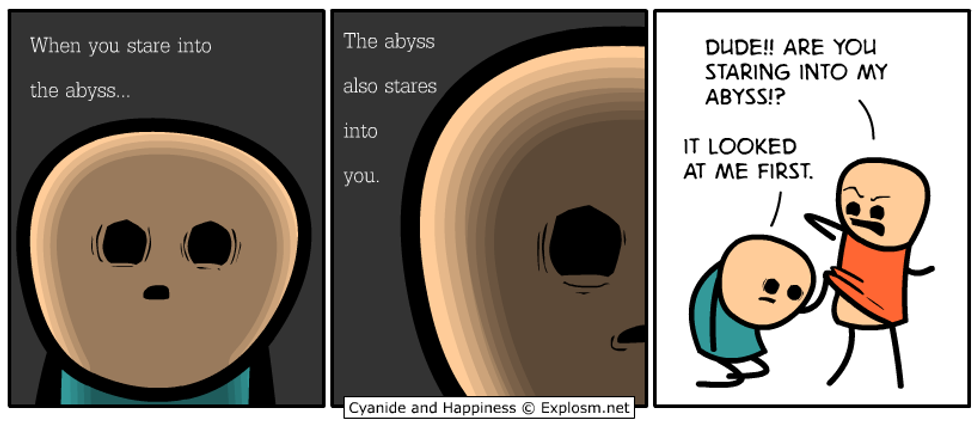Whoever fights monsters should see to it that in the process he does not become a monster. And if you gaze long enough into an abyss, the abyss will gaze back into you.
-Friedrich Nietzsche
Last week we discussed fads. Another fad that doesn't seem to go away is scientism. It stems from the growth of rationalism after the scientific revolution. Scientism basically states we can't discover truth values except through empirical evidence. For instance, if we want to know if something is morally acceptable, we would conduct a study and let science inform us on its utility. If the rats of the sky (pigeons) are found to only cause harm to humanity, it would mean impending extermination. To followers of scientism, theologians, and philosophers are unnecessary. Supposedly, they don't have a damn clue how to come to any truth value with any confidence. The rest of humanity falls into one of a myriad of labels. Personally, I'm a Protestant that is heavily influenced by nihilistic philosophy. I know! How the hell could anyone reconcile such oppositional forces? Better yet, does my question even have any significant meaning? Who knows and, ultimately, who cares?
Nihilism is an existential philosophy that argues nothing in this universe has intrinsic meaning or value. By necessity, it denies the existence of a God or gods. On the other hand, Protestantism is a large religious body that falls under the umbrella of Christianity. Members of this denomination follow various doctrines, but for the sake of simplicity the Protestant argues that man is ultimately flawed and separated from God. He is in direct opposition to God and needs divine intervention to be at peace with Him. He has also given humanity His own image, so by necessity humanity and His creation has intrinsic value. As reality and religion collide, given enough time, cognitive dissonance arises. There are many stories of Protestant children leaving their faith for an existential worldview like nihilism. Mine isn't one of them.
I was born in communist Romania and moved to the United States in the late '80s. My parents, siblings, relatives, and older friends told me many horror stories about living under the communist regime. I also read "Tortured for Christ" by Richard Wurmbrand, which describes the horrible things the regime did to religious people out of mere paranoia that the underground church would cause problems. The problem of pain and evil has plagued religious people throughout the centuries, if not millennia. The possible existence of sin is a possible explanation, but it leaves many of us wanting more. A better explanation is warranted for the starved, trafficked, and raped children of the world. It truly renders our daily tasks mundane.
Religiosity and piety won't escape the scrutiny of this type of nihilism. Billions of people dedicate their lives to a specific religion and nothing seems to be getting better. No fucking surprise non-religious people think religious people are full of shit. No wonder they turn to existential philosophy or scientism. I look at the lives of many religious people and it seems empty, void of any meaning or even a semblance of the imago Dei (image of God). This is where theistic nihilism comes in.
At some point during college, I decided that my life wouldn't be meaningless. Even if my faith proved meaningless in the end, on my death bed I would look back and conclude I've done what I define as "good." The good in which I dedicated my life is taking care of the most vulnerable: the orphan. Almost a year ago, my wife and I adopted three boys through the foster system in Illinois. Instead of dedicating my life to religiosity, I chose to focus my attention on the message I thought the God of the Bible was actually trying to convey: loving Him with all my heart and taking care of the powerless. Theistic nihilism is the idea that nothing has meaning outside of the revealed decree of God. In this worldview, mundane tasks and choices have no specific meaning. It doesn't mean they are fundamentally bad, but that they are morally neutral. For instance, which vocation or residence we choose has no moral implication. The only things that have meaning are loving the holy God and helping the plight of the other. There may be other definitions of theistic nihilism, but they don't seem to get at the heart of the issue.
We ought not live our lives knowing there are many brothers in humanity suffering. This is not a call to invoke the savior complex, but to question the things for which we live. It doesn't imply that all things need profound significance, but that we at least find ways to help the other. Morality isn't depended on religion in a strict sense. Theists, nihilists, or even followers of a paradoxical combination of both need to meditate on things in which we give meaning.




















